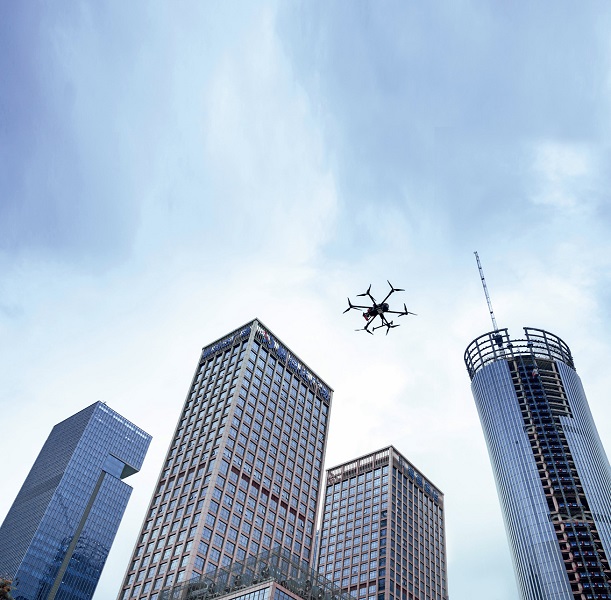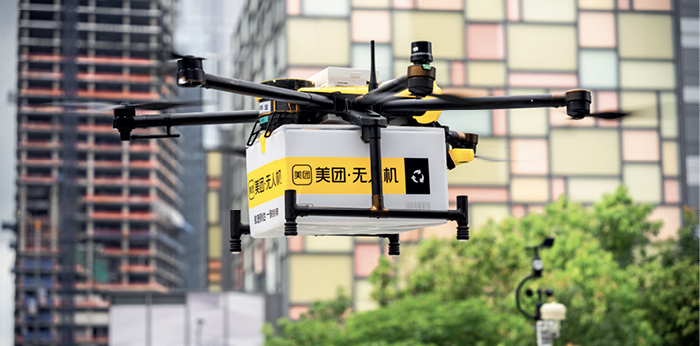The emerging low-altitude industry is innovative, green, and low-carbon.

A drone is delivering express parcels in the Coastal City Shopping Center in downtown Nanshan District, Shenzhen, on June 8, 2024. Low altitude economy has become part of the city’s new quality productive forces, making Shenzhen a leader in this sector.
“Check this out! We are in Shenzhen, China, and we are in the middle of a park, and we are about to have some drinks dropped off by a drone. I’ve never experienced anything like this. The drone is landing now, and we’ve ordered Starbucks. Will the delivery be successful? Let’s have a look.” As soon as Melissa Hutchinson, the mom in the British travel vlogging family the Hutchinsons, finished speaking, a drone carrying a takeout box “came from the sky” and landed on a smart drone delivery locker nearby. Melissa stepped forward and entered the last four digits of her phone number on the screen of the locker. The window immediately opened, and she fished out the package sitting there. Inside the cardboard box was the familiar brown Starbucks paper bag with her matcha tea inside.
“It’s unbelievable! Our first ever Starbucks delivered by a drone. I never thought of myself being in the middle of a park in Shenzhen drinking Starbucks delivered by a drone. Cheers to future!” A euphoric Melissa recorded the first-time experience on her mobile phone.
With China recently extending its 144-hour visa-free transit policy to more countries, a large number of foreign tourists are now flocking in. They shoot videos to record their travels in China and many overseas netizens, who have never been to China, see a modern, futuristic, and beautiful China instead of the stereotypes created by some media.
“China travel” has become a trending hashtag on social media platforms, such as TikTok and YouTube. The Hutchinsons, Melissa and her husband Chris, who embarked on their first trip to China with their three young daughters Olivia, Scarlett and Bella, received a lot of attention on domestic and foreign short video platforms with their travel vlogs, especially the one in which she ordered food on WeChat and a drone delivered it. Many commented on this video, all of them impressed by China’s technological development.
In China, the industry of drones and aerial vehicles operating in the airspace between the ground and 1,000 meters above ground is part of the “low-altitude economy,” which revolves round the low-altitude flight activities of civil manned and unmanned aerial vehicles (UAVs). During this year’s “Two Sessions,” the meetings of China’s top legislature and political advisory body, the Chinese government stated in the Report on the Work of the Government that new growth engines will be fostered in such fields as the low-altitude economy.
Pie from the Sky
A well-known food delivery company Meituan’s drone food delivery is an exploration of high technology.
Meituan began experimenting with drone food delivery in China’s technology hub Shenzhen in 2021.
Drone food delivery, unlike deliveries by the ground-based delivery boy, is not interrupted by traffic lights or traffic jams. The food is delivered directly to the consumer from the place of departure, making the entire process more efficient. In terms of operation, this involves human-machine cooperation.
Wang Zhen, senior manager at Meituan, explained how the logistics works: “Someone places an order, our delivery boy goes to the seller to pick up the food and transports it to the nearest departure point. There he quickly packs and weighs it and attaches it to the drone. The drone then delivers the package to the smart drone delivery locker near the buyer, following the route mapped by the terminal system.” Once the takeout is put on the drone, the rest of the operation is done by technology. As the established route, subjected to multiple rounds of testing, does not require real-time control by humans, there is no need for Meituan’s staff and remote technicians to control the drone. They only need to play a surveillance role. “In Meituan, every Beyond Visual Line-of-Sight commander can monitor five to 10 drones simultaneously,” Wang said.
Autonomous operation is the key to Meituan’s drone service. Data from Meituan’s UAV low-altitude operation management center shows that in a relatively small area, there are often 100 to 200 drones flying at the same time. In Shenzhen, for example, it is very common to see 20 to 30 drones delivering food around a shopping mall at the same time. The refined dispatching and high-frequency take-off and landing capabilities demonstrate Meituan’s leading technology in the field. After just over three years of operation, as of December 2023, Meituan’s cumulative takeaway orders delivered by drones in Shenzhen had exceeded 230,000.
The novelty and greater convenience provided by drone delivery services has been warmly welcomed by users. Meituan’s data shows that during this year’s Spring Festival holiday, the number of drone deliveries in many parks in Shenzhen increased rapidly. The majority of the orders were for fast food like fried chicken and burgers. At many food outlets, more than 80 percent of takeout orders request drone deliveries.
By the end of March 2024, Meituan drones had been operating on 28 routes in 11 business districts in Shenzhen, Shanghai and other cities, and the delivery services covered offices, scenic spots, municipal parks, medical care facilities, and campuses. The average delivery time in 2023 was about 20 minutes, saving consumers more than 10,000 hours in waiting time in total.
Behind this data are the efforts of technicians who overcome difficulties time and again. Meituan’s UAV intelligent manufacturing center demonstrates the core technologies of its UAVs, including avionics panels, parachutes, perception systems, radar systems, and motors. Most of them are independently developed. The most eye-catching one is the drone parachute independently developed by Meituan.
At the launch conference for Meituan’s fourth-generation drone in July 2023, Mao Yinian, head of the company’s drone business department, said Meituan’s drones are the first among all logistics drones to be equipped with a standard parachute. It took the R&D team 18 months to finally coordinate the parachute, flight control, and the entire vehicle. The fourth-generation drones are safer, have increased transport capacity compared with the third generation, and are more resistant to severe weather and extreme environments.
According to Mao, the fourth-generation UAVs integrate a lot of sensing and computing capabilities, which has greatly improved their autonomous and intelligent capabilities. With AI-powered large language models, human cognition can be transferred to machines, enabling the latter to learn by themselves.
Policy support is particularly important for this industry and establishing a smoother multi-party communication channel is crucial for further development of Meituan’s drone business. “We have to explain why we are building the systems of airports and dispatching. We have to explain that it is safe, it can run more frequently, it does not disturb people, and at the same time can ensure user privacy. Compared with technology research and development, these multi-party communications require a relatively long process,” Mao said.

A Meituan drone is delivering a food takeout box in the Coastal City Shopping Center in downtown Nanshan District on June 8, 2024. Low altitude economy innovation projects are gradually changing the lives of local people.
Life & Production Becoming 3D
In addition to drones delivering food over highrises in Shenzhen and spraying pesticides in cotton fields in Aksu, Xinjiang Uygur Autonomous Region, the low-altitude economy is also rapidly developing in sightseeing, security, medical care, emergency rescue, power inspection, and other fields, making production and life more “three-dimensional.”
The low-altitude economy is an emerging industry which is innovative, green, and low-carbon. It is a typical new-quality productive force and an important direction for cultivating new development momentum.
The Central Economic Work Conference held at the end of 2023 proposed fostering several strategic emerging industries, such as biomanufacturing, commercial spaceflight, and low-altitude economy. On March 27, 2024, the Ministry of Industry and Information Technology, the Ministry of Science and Technology, the Ministry of Finance, and the Civil Aviation Administration of China jointly issued an implementation plan on the innovative application of general aviation equipment in the 2024-2030 period. The plan envisions that by 2030, general aviation equipment will be fully integrated into all areas of people’s production and life, becoming a powerful driving force for low-altitude economic growth and forming a trillion-yuan market.
From south to north and from west to east, many places in China have joined the low-altitude economy market. Since each city has different resources and market demands, the application scenarios also vary greatly. For example, in the mountainous areas of southwest China, it is inconvenient for tourists to travel to scattered scenic spots. Low-altitude shuttle air buses providing aerial sightseeing can improve transportation between scenic spots.
In the vast and sparsely populated northwestern region, agricultural, forestry and plant protection are popular application scenarios. In the coastal areas in southeast China, developing low-altitude logistics is more suitable.
Experts say driven by technologies, such as the Internet, satellite navigation, cloud computing, artificial intelligence, and blockchain, the low-altitude economy can achieve a higher degree of commercialization. Many places across China are seizing the opportunity. This will accelerate industry agglomeration and lead the development of the low-altitude economy onto a new track.